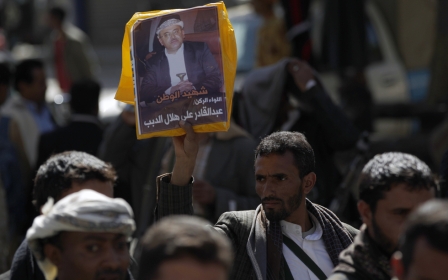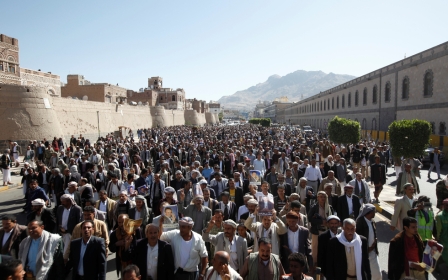UK ministers supporting Saudi in Yemen may be liable for war crimes

The escalating war in Yemen has subverted the international order. Since the end of World War Two, there has been a pattern of client regimes engaging in proxy wars on behalf of major powers. Today it is the other way around.
In Yemen, Britain and the United States are dancing to the Saudi tune.
Crucially, Saudi Arabia and its allies did not attack Yemen on behalf of the West. It is Britain and the US who are facilitating Saudi Arabia’s war.
We provide Saudi Arabia with arms and military advice, give moral support and, through the UN Security Council, essential diplomatic protection.
Britain has, in short, become Saudi Arabia’s proxy on the international stage as it pummels Yemen from the air in an attempt to restore Abd Rabbuh Mansour Hadi - the internationally recognised Yemeni president who fled to Riyadh, begging for protection, after he was chased out of his country by rebels from the north Yemen Houthi movement.
This is the very troubling diplomatic background to the funeral bombing in the Yemeni capital of Sanaa on Saturday. Even though four days have passed, details are still emerging. Nobody is yet certain how many died.
Official figures state 140 were killed, along with countless injured, many of whom need urgent medical treatment which is unavailable in Sanaa hospitals. However, thanks to the Saudi air blockade, they cannot get out of the country to obtain the life-saving treatment they need.
Wretched response
Britain bears a very heavy responsibility for this murder, mayhem and carnage. Yet the response from Middle East Minister Tobias Ellwood has been wretched.
He says that he had "raised concerns" with Saudi Arabia. I have studied the minister’s morally abject statement. The unfortunate Ellwood cannot even bring himself to condemn the attack, and has not demanded an independent investigation.
This is part of a pattern of behaviour from Ellwood. I am coming to believe that his persistent failure to condemn the savage acts committed by Saudi Arabia and its allies in the Yemeni conflict makes him an accessory to mass murder.
Consider the facts: in the face of repeated Saudi atrocities, Britain continues to supply arms to Saudi Arabia and we have effectively blocked the establishment of an international independent investigative mechanism to look into the conflict.
A calamity is unfolding in Yemen and it's time the world woke up
Meanwhile, Britain has advisers in control rooms assisting Saudi-led coalition bombing raids across Yemen. What on earth are they doing there?
A Ministry of Defence spokesman told The Telegraph in January that these advisers are in Saudi Arabia to ensure “best practice” and make sure that international humanitarian law is observed.
If that is the case, Britain's military advisers in Saudi Arabia are a bunch of incompetents who are failing scandalously in their task. Either they are indeed exceptionally incompetent, or the government is not being straight about their true role.
There are urgent, burning questions to be answered about the true role of British advisers in Saudi Arabia as the massacre of civilians continues.
Parliament misled
We also know that Ellwood (and other ministers) have repeatedly misled the House of Commons about their knowledge of Saudi atrocities, something they were obliged to confess in statements in July.
Meanwhile, he makes excuses for Saudi conduct. This is what he told MPs on the floor of the Commons in January: “We are aware that the Houthis, who are very media-savvy in such a situation, are using their own artillery pieces deliberately, targeting individual areas where the people are not loyal to them, to give the impression that there have been air attacks.”
On Tuesday, I asked the Foreign Office for evidence to support Ellwood’s eye-catching claim that the Houthis were massacring their own people in order to fool the world into thinking that the Saudis were attacking Yemeni civilians.
How Yemen's past is being erased one air strike at a time
An official declined to answer on the basis that "we can’t comment on intelligence matters" and suggested that I approach Saudi Arabia to find out more.
The example of Iraq stands there as a stark warning of the dangers inherent in misuse of intelligence. I am afraid that the Saudi government (which will not admit responsibility publicly for the weekend attack on the funeral) does not carry credibility.
So what’s going on? Either Ellwood is very stupid and naïve or, alternatively, he misled the House of Commons and also the British people in order to cover up Saudi mass murder.
Which is it? I have met Mr Ellwood, a former army officer, once or twice, and he did not appear to me to be especially bright. After resigning his commission at the rank of captain, he went into business, and worked in business development on the London Stock Exchange before entering politics.
Some observers attach significance to the fact that the London Stock Exchange is currently competing against rivals to list the Saudi oil giant Aramco. This would be the largest flotation in history and is a mouthwatering prize. Britain is naturally desperate to win the business.
I don’t think there is anything in this. My guess would be that Ellwood is acting from a tragically misplaced sense of British patriotism which leads him to believe that it is in our national interest to stand by and support a close ally as it massacres civilians in a neighbouring country.
If so, I am afraid he has taken a terrible wrong turn. Decent man he way be, but Ellwood fails to understand what Britain stands for across the world. And that, for the rest of his life, he will chiefly be remembered for his role in British complicity in mass murder in Yemen.
Criminal liability
This takes us into uncomfortable and complex territory. I believe there is no doubt that British ministers are morally responsible for sanctioning Saudi atrocities.
Are they legally responsible as well? Will they ultimately be required to pay not just a moral but also a legal and perhaps a criminal price?
As the slaughter goes on, this is becoming more and more of a live issue.
On Monday, Reuters revealed that legal advisers in the US State Department have privately fretted that US officials could be prosecuted as a result of their role in backing the Saudi air campaign in Yemen.
Sanaa: A tale of two leaders in a city without hope
Reuters has obtained emails and other records connected with US involvement in the Saudi-led war on Yemen. One of these emails made a specific reference to a ruling in 2013 from the war crimes trial of ex-Liberian president Charles Taylor. The ruling widened the international definition of aiding and abetting war crimes to include “practical assistance, encouragement or moral support”.
These legal considerations are even more relevant to the UK than to the US because Britain (unlike the US) is fully signed up to the Rome Statute, the treaty which set up the International Criminal Court (ICC) to investigate crimes under international law.
This means that ministers could be individually liable before an appropriate international criminal tribunal (for instance the ICC) for war crimes.
Friendly advice
Crucially, when it comes to possible complicity in the commission of war crimes, crimes against humanity or genocide, ministers and government leaders are precluded from citing immunities usually associated with being heads of states and heads of government.
So I have some friendly but deadly serious advice for Tobias Ellwood: be careful how you go as you defend your Saudi friends.
The same applies to the Foreign Secretary Boris Johnson. To be fair to Johnson, he is relatively new to his portfolio.
However, unless he dramatically changes British policy, he like Ellwood risks making himself personally liable to prosecution for giving “practical assistance, encouragement or moral support” to the Saudi killing machine in Yemen.
I believe that this risk may help explain Britain’s refusal to sanction an international independent UN inquiry into the atrocities committed by all sides in Yemen.
After all, there is no telling where such an inquiry may lead. A UN inquiry might well recommend the setting up of a tribunal which could, in turn, lead to the prosecution of British ministers for complicity in possible war crimes.
At this point, the spectre of Boris Johnson and Tobias Ellwood, heads bowed, facing war crimes related charges at the Hague starts to loom
So it is not just loyalty to an ally that lies behind Britain’s decision to effectively block an independent international investigation in the atrocities. It is naked self-interest from British ministers who face the long-term danger of prosecution for complicity in mass murder.
- Peter Oborne was named freelancer of the year 2016 by the Online Media Awards for an article he wrote for Middle East Eye. He was British Press Awards Columnist of the Year 2013. He resigned as chief political columnist of the Daily Telegraph in 2015.
The views expressed in this article belong to the author and do not necessarily reflect the editorial policy of Middle East Eye.
Photo: Yemenis bury the members of the same family during their funeral on 8 October 2016 a day after they were killed in a reported airstrike by Saudi-led coalition air-planes that hit their house in Bajil in the western province of Houdieda (AFP)
Middle East Eye propose une couverture et une analyse indépendantes et incomparables du Moyen-Orient, de l’Afrique du Nord et d’autres régions du monde. Pour en savoir plus sur la reprise de ce contenu et les frais qui s’appliquent, veuillez remplir ce formulaire [en anglais]. Pour en savoir plus sur MEE, cliquez ici [en anglais].





